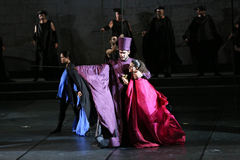| Opera Reviews | 19 April 2024 |
Mercadante's opera gets its world premiere 185 years after its compositionby Silvia Luraghi |
|
| Mercadante: Francesca da Rimini Festival della Valle d'Itria, Martina Franca 30 July 2016 |
|
|
The choice was perfectly in line with the Festival’s mission, which has always been to discover lesser known and seldom (or never) performed works, with a special eye to local composers (Mercadante was born in nearby Altamura). Mercadante’s opera relies on the work of one of the most renowned librettists of his age, Felice Romani, who in his turn adapted a tragedy by Silvio Pellico, inspired by Dante’s celebrated verses, which enjoyed great success in the first part of the 19th century. The music partly echoes Rossini’s style, but also hints to the new style that he adopted in the late 1830s, and explicitly described in a number of letters (his so-called ‘reform’). The vocal score calls for bel canto specialists skilled in a virtuoso style, and is especially demanding on the tenor and the soprano. The opera opens on the return of Lanciotto to his bride Francesca, who however does not rejoice as he had expected: she is in love with Paolo, Lanciotto’s brother, who has also returned. Lanciotto is suspicious, but Paolo tries to reassure him. When he meets Francesca the two cannot resist their love, just to be discovered by Lanciotto, who draws the blade on his brother. Francesca’s father Guido stops him. In the second act, Guido tries to rescue his daughter, but in the end Lanciotto manages to kill her while Paolo takes his own life. The opera was sung by a cast of highly talented young singers. As it had never been performed before, all singers were obviously making their role debut, a challenge that they all successfully overcame. Tenor Merto Sungu in the role of Lanciotto, displayed a ringing high range, in spite of a slightly nasal emission, and mastered the top notes with little effort. Soprano Leonor Bonilla was a delicate and touching Francesca, very compelling in her cavatina. I especially appreciated mezzo Aya Wakizono, a deeply committed Paolo, especially expressive in the first act duet with Francesca. The cast was skillfully completed by bass Antonio Di Matteo, an authoritative Guido, soprano Larisa Martinez as Isaura and tenor Ivan Ayon Rivas as Guelfo. Pier Luigi Pizzi directed the production, setting the action on an empty stage, with the wind moving the black drapes on the sides and the singers’ costumes, gray for all principals except for Francesca, in a red long gown, while the chorus and the dancers wore white. The wind represented the moving passions, and also hinted at Dante’s setting of the lust cycle in the fifth canto of his Inferno, where the souls are buffeted without rest by violent winds. The score profited much from the insightful musical direction of conductor Dario Luisi, who highlighted its richness, and was able to capture the audience’s attention in spite of no previous knowledge of the music.
|
|
| Text ©
Silvia Luraghi Photo © Festival della Valle d'Itria |

 An unknown pearl came to light when the 42nd Festival della Valle d’Itria in Martina Franca presented the world premiere of Saverio Mercadante’s opera Francesca da Rimini. Composed between 1830 and 1831, during a stay of the composer in Madrid, the opera was never performed for unclear reasons connected with problems in Spanish opera companies, and possibly with conflicts over the prospective prima donna. Mercadante then tried to have the opera performed at other venues in Italy, but an almost concluded deal with La Scala came to naught, apparently again for problems with another prima donna.
An unknown pearl came to light when the 42nd Festival della Valle d’Itria in Martina Franca presented the world premiere of Saverio Mercadante’s opera Francesca da Rimini. Composed between 1830 and 1831, during a stay of the composer in Madrid, the opera was never performed for unclear reasons connected with problems in Spanish opera companies, and possibly with conflicts over the prospective prima donna. Mercadante then tried to have the opera performed at other venues in Italy, but an almost concluded deal with La Scala came to naught, apparently again for problems with another prima donna. 





